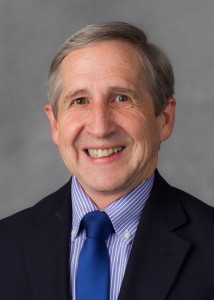Gladding writes new volume in history of Wake Forest University
Counseling professor Sam Gladding, whose dozens of books about counseling are read worldwide, is focused now on a topic very close to home and his heart—Wake Forest University and its history.
Recently, he completed a nine-year project to write “The History of Wake Forest University: Volume 6.” The book tells the story of the University when it was led by Thomas K. Hearn Jr. From 1983 until his retirement in 2005, Hearn served as Wake Forest’s 12th president. He also was the University’s second-longest serving president with 22 years at the helm.
“Wake Forest went from a strong regional, Baptist-affiliated university to a top 30 national, independent institution of higher learning,” according to Gladding, a Wake Forest alumnus who returned to the University in 1990 as assistant to the president for special projects and professor of counseling. He later spent several years as associate provost before focusing all of his efforts at the University on the Department of Counseling.
An opportunity to have the book signed by Gladding is ahead. On April 9, he will be signing on campus at Words Awake 2, a two-day celebration of Wake Forest-associated writers and writing. The signing will be held from 5 p.m. to 6:30 p.m. at Benson University Center, fourth floor. Also signing books will be Provost Emeritus Ed Wilson, author of “The History of Wake Forest University, Volume V,” which focused on the University between 1967-83, when James Ralph Scales was president.
A private signing event for Gladding, organized by the Office of the Provost, is scheduled for late April, also.
In March, Gladding’s book became available through Amazon in different formats, including paperback and Kindle. On April 7, the hardback edition is expected to be delivered to campus and be available for sale and signing. It will be carried by the College Book Store.
“I wrote Volume 6 to give back to Wake Forest for all it has given me as a student, an administrator and a professor,” Gladding said. “I have been fortunate to be in a position where I am able to give back to Wake Forest as a writer.”
Gladding, who devoted years to researching Wake Forest history, declares in the book that 1983-2005 was an exciting, impactful time with a long list of achievements and milestones.
The book “traces the events that led to the explosive growth and influence of Wake Forest,” according to Gladding.
Some University highlights during those years include the following:
- Achieved independent governance from the Baptist State Convention of North Carolina.
- Ran successful capital campaigns that attracted gifts to transform Wake Forest.
- Invested tens of millions of dollars in the construction of new buildings and the expansion and renovation of existing buildings.
- Increased financial aid for students.
- Increased the number of faculty.
- Garnered greater amounts of outside funding for research.
- Expanded the size of the enrollment with some of the country’s top-achieving students.
- Magnified the University’s national influence.
- Attracted two presidential debates (George H.W. Bush/Michael Dukakis and George W. Bush/Al Gore) that brought enormous national attention to the University, bolstering its growing prominence.
Gladding describes Hearn as “a visionary and decisive leader.”
“With him, and even sometimes ahead of him, was a supporting cast of faculty, students, administrators and staff who were creative, innovative, but above all concerned with how to live and implement the University’s motto: Pro Humanitate,” according to Gladding.
After a long illness, Hearn died in 2008, three years after his retirement.
Gladding joined Wake Forest’s administration and faculty after holding faculty positions at the University of Alabama at Birmingham, Fairfield University and elsewhere. He had earned a bachelor’s degree in history and a master’s degree in counseling at Wake Forest, previously. He received a master’s degree in religion at Yale University and a doctorate in human development and family studies at the University of North Carolina at Greensboro.
After returning to Wake Forest, he chaired the counseling department for several years and continues now as a professor in the department, teaching and writing. Nationally, Gladding is recognized as one of the most published authors in his field. He is the author of 45 books (including revisions) on counseling topics. He regularly travels worldwide, lecturing at universities and delivering keynote addresses at national and international gatherings of counseling professionals.
Categories: Happening at Wake, University Announcements

